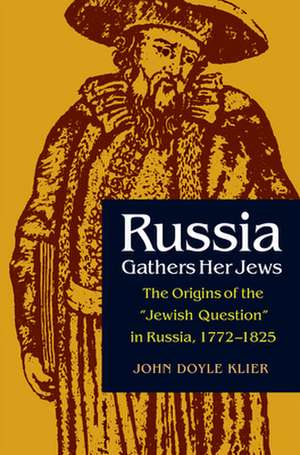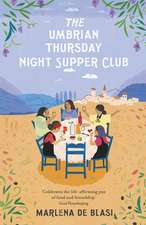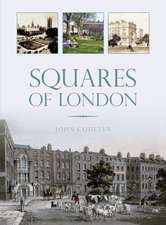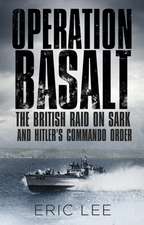Russia Gathers Her Jews: The Origins of the "Jewish Question" in Russia, 1772-1825: NIU Series in Slavic, East European, and Eurasian Studies
Autor John Doyle Klieren Limba Engleză Paperback – 23 feb 2011
This classic study, by the late John Doyle Klier, is considered a seminal text in modern Jewish history by one of the foremost scholars in the field. In this, his first book, Klier offers an important analysis of Russia’s early acquisition of, attitudes toward, and administration of its Jewish population. He argues that the Russian response to the Jewish Question was based less on a tradition or religious antipathy than on the failure to develop a consistent, well-articulated policy in the face of a new and unusual problem. This failure led to ineffective social legislation and became the legacy of Russia’s first encounter with the Jews. This essential book will be of enduring interest to scholars of modern Russian and Jewish history.
| Toate formatele și edițiile | Preț | Express |
|---|---|---|
| Paperback (1) | 245.70 lei 6-8 săpt. | |
| Northern Illinois University Press – 23 feb 2011 | 245.70 lei 6-8 săpt. | |
| Hardback (1) | 347.20 lei 6-8 săpt. | |
| Northern Illinois University Press – 30 noi 1986 | 347.20 lei 6-8 săpt. |
Din seria NIU Series in Slavic, East European, and Eurasian Studies
-
 Preț: 138.18 lei
Preț: 138.18 lei -
 Preț: 89.68 lei
Preț: 89.68 lei -
 Preț: 197.11 lei
Preț: 197.11 lei -
 Preț: 185.88 lei
Preț: 185.88 lei -
 Preț: 239.52 lei
Preț: 239.52 lei -
 Preț: 169.95 lei
Preț: 169.95 lei -
 Preț: 131.39 lei
Preț: 131.39 lei -
 Preț: 130.71 lei
Preț: 130.71 lei -
 Preț: 216.21 lei
Preț: 216.21 lei -
 Preț: 219.33 lei
Preț: 219.33 lei -
 Preț: 114.05 lei
Preț: 114.05 lei -
 Preț: 238.40 lei
Preț: 238.40 lei -
 Preț: 255.55 lei
Preț: 255.55 lei -
 Preț: 179.03 lei
Preț: 179.03 lei -
 Preț: 205.71 lei
Preț: 205.71 lei -
 Preț: 190.06 lei
Preț: 190.06 lei -
 Preț: 153.39 lei
Preț: 153.39 lei -
 Preț: 255.62 lei
Preț: 255.62 lei -
 Preț: 127.66 lei
Preț: 127.66 lei -
 Preț: 200.18 lei
Preț: 200.18 lei -
 Preț: 131.46 lei
Preț: 131.46 lei -
 Preț: 285.23 lei
Preț: 285.23 lei -
 Preț: 191.59 lei
Preț: 191.59 lei -
 Preț: 175.99 lei
Preț: 175.99 lei -
 Preț: 215.93 lei
Preț: 215.93 lei -
 Preț: 177.43 lei
Preț: 177.43 lei -
 Preț: 150.97 lei
Preț: 150.97 lei -
 Preț: 283.86 lei
Preț: 283.86 lei -
 Preț: 185.25 lei
Preț: 185.25 lei -
 Preț: 216.00 lei
Preț: 216.00 lei -
 Preț: 214.64 lei
Preț: 214.64 lei -
 Preț: 178.19 lei
Preț: 178.19 lei -
 Preț: 136.13 lei
Preț: 136.13 lei -
 Preț: 201.03 lei
Preț: 201.03 lei -
 Preț: 351.49 lei
Preț: 351.49 lei -
 Preț: 185.82 lei
Preț: 185.82 lei -
 Preț: 108.71 lei
Preț: 108.71 lei -
 Preț: 191.37 lei
Preț: 191.37 lei -
 Preț: 136.13 lei
Preț: 136.13 lei -
 Preț: 118.20 lei
Preț: 118.20 lei -
 Preț: 261.47 lei
Preț: 261.47 lei -
 Preț: 202.52 lei
Preț: 202.52 lei -
 Preț: 162.54 lei
Preț: 162.54 lei -
 Preț: 223.69 lei
Preț: 223.69 lei -
 Preț: 270.18 lei
Preț: 270.18 lei -
 Preț: 158.38 lei
Preț: 158.38 lei
Preț: 245.70 lei
Nou
Puncte Express: 369
Preț estimativ în valută:
47.02€ • 48.81$ • 39.21£
47.02€ • 48.81$ • 39.21£
Carte tipărită la comandă
Livrare economică 22 martie-05 aprilie
Preluare comenzi: 021 569.72.76
Specificații
ISBN-13: 9780875809830
ISBN-10: 0875809839
Pagini: 260
Dimensiuni: 152 x 229 x 23 mm
Greutate: 0.41 kg
Ediția:1
Editura: Northern Illinois University Press
Colecția Northern Illinois University Press
Seria NIU Series in Slavic, East European, and Eurasian Studies
ISBN-10: 0875809839
Pagini: 260
Dimensiuni: 152 x 229 x 23 mm
Greutate: 0.41 kg
Ediția:1
Editura: Northern Illinois University Press
Colecția Northern Illinois University Press
Seria NIU Series in Slavic, East European, and Eurasian Studies
Recenzii
“Professor John Klier was a pioneering historian of Russian Jewry and a pivotal figure in academic Jewish studies and East European history in the UK and beyond.”—The Times of London
“[Klier] did more than anyone to improve understanding of the tormented relations among Jews and Russians from the late 18th century to the present day.”—The Guardian
“Klier’s analysis of the motivations behind government policies and attitudes is well documented and convincing. . . . [An] important and well-researched monograph.”—The Journal of Modern History
Notă biografică
John Doyle Klier (1944—2007) was a notable scholar of European Jewish history. He was the author of Imperial Russia’s Jewish Question, 1855-81 and coeditor of Pogroms: Anti-Jewish Violence in Russian History, among other works.
Descriere
This classic study, by the late John Doyle Klier, is considered a seminal text in modern Jewish history by one of the foremost scholars in the field. In this, his first book, Klier offers an important analysis of Russia’s early acquisition of, attitudes toward, and administration of its Jewish population. He argues that the Russian response to the Jewish Question was based less on a tradition or religious antipathy than on the failure to develop a consistent, well-articulated policy in the face of a new and unusual problem. This failure led to ineffective social legislation and became the legacy of Russia’s first encounter with the Jews. This essential book will be of enduring interest to scholars of modern Russian and Jewish history.














